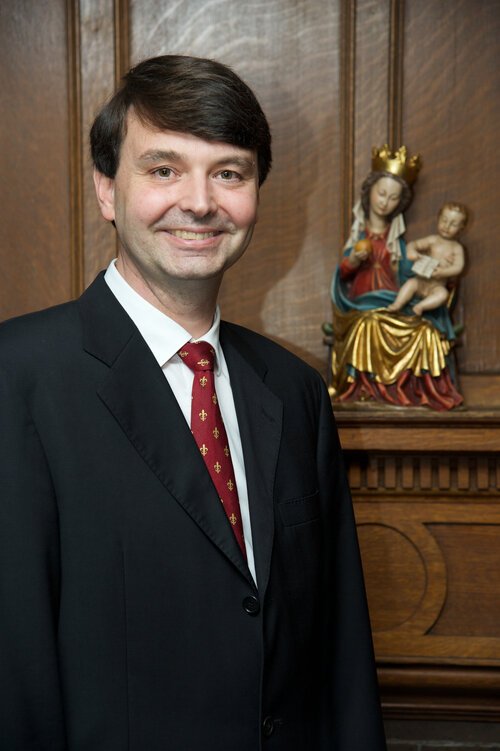“Let’s Avoid the Term ‘Vegetative State’”
François-Léon Benouville, Christian Martyrs Entering the Amphitheatre, 1855.
The term Persistent Vegetative State (PVS) is commonly used to describe patients who are brain-injured and in a wakeful but unconscious state. Ethically, it is highly problematic and even pejorative to refer to living human beings in a way that makes them seem like “vegetables.” Quite a few scientific experts recommend using different terminology, such as Unresponsive Wakefulness Syndrome (UWS) or post-coma unresponsiveness. St. John Paul II also objected to the term “vegetative” when speaking of patients and noted the danger of not recognizing their inherent human dignity in a 2004 address.
Faced with patients in similar clinical conditions, there are some who cast doubt on the persistence of the "human quality" itself, almost as if the adjective "vegetative" (whose use is now solidly established), which symbolically describes a clinical state, could or should be instead applied to the sick as such, actually demeaning their value and personal dignity. In this sense, it must be noted that this term, even when confined to the clinical context, is certainly not the most felicitous when applied to human beings.
Since the introduction of the language of “vegetative state” in the 1970s, many have been falsely led to believe that patients exhibiting PVS/UWS cannot recover and should have their deaths hastened by withholding food and water. St. John Paul II strongly reaffirmed the moral duty to provide basic care to unconscious patients including nutrition, hydration, cleanliness, warmth, etc.
Radical feminists, extreme liberals, and dictators all see the importance of controlling language. They create new words and slogans to further their ideologies and protest against terms or usage that do not support their positions. The forces promoting abortion insist on the misleading phrase “pro-choice” to describe themselves and refuse to accept that their opponents are “pro-life.” Instead, they call them “anti-abortion” or even “anti-choice.” I think that the Church and Catholic bioethicists should be extremely careful about adopting phrases that can serve to obscure the dignity of the human person (see my earlier essay on why it is problematic to speak about “destroying” embryos that are in fact killed).
Scientifically there are three main clinical cases of living patients with acute brain injuries, known as disorders of consciousness. The comatose patient exhibits a total lack of consciousness and no sleep-wake cycles or opening of the eyes. It usually resolves within weeks in the patient’s death or transitioning to one of the other disorders of consciousness, the so-called “vegetative state” or unresponsive wakefulness, or the minimally conscious state. Those in a minimally conscious state not only have sleep/wake cycles but show signs of awareness such as being responsive to simple commands and being able to smile or cry when given emotional stimuli. It is rather common for patients to progress from one state to the next as they recover.
Unfortunately, as many as 40% of patients are misdiagnosed as being in a “vegetative state.” Among the worst examples is classifying people as suffering from PVS who remain fully conscious but cannot respond because of undiagnosed locked-in syndrome. Some have at times helplessly heard doctors and family members discussing at their bedside whether to discontinue feeding or life support. There is also often a lack of medical knowledge or follow-up to see if patients are progressing to a minimally conscious state.
One step in the right direction was taken when the American Academy of Neurology (AAN) in 2018 changed their official terminology from “permanent vegetative state” to “chronic vegetative state” for patients who remain unresponsive for three months following a non-traumatic brain injury, or over twelve months following a traumatic brain injury. This reflects the fact that the AAN documented some patients recovering consciousness even after a year. They recognized it as misleading to speak of a permanent state of unconsciousness. The popular press and movies love to tell the true stories of people who wake up after several years in a coma or unconscious state.
The NCBC published an FAQ “On Caring for Patients in a Persistent Vegetative State (PVS)” that recalls the dignity of these persons. “The word vegetative does not mean that the person has become less than human, but rather has lost, at least temporarily, the sort of awareness that characterizes normal adult human life.” It also points out that Catholic hospitals should not honor directives that withdraw nutrition and hydration from unconscious patients, when this will clearly cause their deaths. Patients who can still benefit from assisted hydration and nutrition should receive it.
I conclude with the fundamental Catholic belief restated recently in the Declaration Dignitas Infinita from the Dicastery for the Doctrine of the Faith: “Every human person possesses an infinite dignity, inalienably grounded in his or her very being, which prevails in and beyond every circumstance, state, or situation the person may ever encounter.” In light of this and the scientific facts, I believe that all references to unconscious patients being “vegetables” or in a “vegetative state” are offensive and inaccurate. The alternative medical term of Unresponsive Wakefulness Syndrome is highly preferable. I urge medical professionals and ethicists who wish to affirm the dignity of those suffering from unconsciousness to use this or similar terminology.
Joseph Meaney received his PhD in bioethics from the Catholic University of the Sacred Heart in Rome. His doctoral program was founded by the late Elio Cardinal Sgreccia and linked to the medical school and Gemelli teaching hospital. His dissertation topic was Conscience and Health Care: A Bioethical Analysis. Dr. Meaney earned his master’s in Latin American studies, focusing on health care in Guatemala, from the University of Texas at Austin. He graduated from the University of Dallas with a BA in history and a concentration in international studies. The Benedict XVI Catholic University in Trujillo, Peru, awarded Dr. Meaney an honorary visiting professorship. The University of Dallas bestowed on him an honorary doctorate in Humane Letters in 2022.


